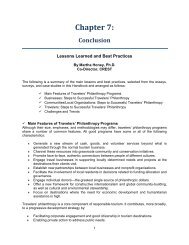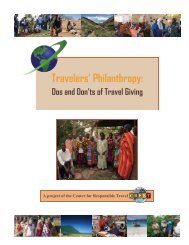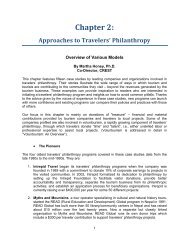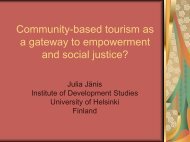Travelers' Philanthropy Handbook - Center for Responsible Travel
Travelers' Philanthropy Handbook - Center for Responsible Travel
Travelers' Philanthropy Handbook - Center for Responsible Travel
Create successful ePaper yourself
Turn your PDF publications into a flip-book with our unique Google optimized e-Paper software.
to me as an option. Besides, it’s much easier to negotiate with a person than with anorganization, particularly if I have no idea of organizational dynamics and if time is of theessence. Remember, I’m leaving early tomorrow morning. If this thing isn’t settled within anhour, the whole deal is off.What happens if I pass the money and responsibility to the lodge owner? For one thing, itincreases stratification within a social system that now includes the village and the tourist lodge,giving the lodge owner even more money and leverage over the villagers than be<strong>for</strong>e. Itmeans that villagers are now dependent not just on me but also on the lodge owner who willdecide who wins the contract, who is hired to dig the well or put up the bridge’s foundations.What it also does, in a much more subtle way, is to undercut local people’s sense of selfreliance,autonomy, and dignity. After all, I said I wanted to help them. But when push cameto shove, words to actions, I didn’t trust any of them to get the job done.If one reason <strong>for</strong> my helping others was to increase their capacity to make their own decisionsand carry them out, then I have just undermined my own intentions.• Impulse Giving vs. Community PrioritiesAnother point: the donor often decides what to do on an impulsive basis. This is entirelyunderstandable. I’m in the village <strong>for</strong> one or at most two days. I thus have a window of a fewhours within which to decide about something of which I was completely unaware be<strong>for</strong>e Ientered the village. I’m walking along a dusty path near the village, and I see a little girl. Shecomes up to me, smiles broadly, and says, “Mister, I want to go to school. But I don’t have theschool fees.” Well, that’s it. I respond impulsively and generously to a human being, not to theThird World, not to the world’s poor, but to this one little girl with the wide eyes and beguilingsmile and utterly commendable desire to become a student.What’s not to like about this scenario? Part of its ethical value is its impulsiveness, itsspontaneity. Things just happened this way; I didn’t plan <strong>for</strong> them or expect them. And isn’t itdelightful to have a genuine, unexpected experience once in a while? Isn’t that very possibility,at some deep level, why I decided to be a tourist andvisit this far-off spot? What a contrast to myitinerary, which is planned down to the last 30minutes!But there is a downside. This unplanned encounteris a random event. I decide to pay the little girl’sschool fees or support the village primary schoolsimply because I met the girl on the path. This hasnothing to do with the needs or preferences of thevillage. There may or may not be a way to determinetheir collective preferences. But even if there is, IJungle Bay community project,don’t have the time or energy to find out what it is.Dominica. Credit: Jungle BaySuppose that the villagers, or leaders in whom theyhad confidence, felt that health or agriculture or a paved road to a large market town was ahigher priority than education, shouldn’t that have changed the content of my gift? Ideally, Iwant the gift to meet the wants, needs, priorities of the recipients. But given limited time andthe emotional power of the random experience I just had, the chances of a comprehensive,thoughtful, deliberative process occurring, with many parties involved in the discussion, are justabout nil.187















